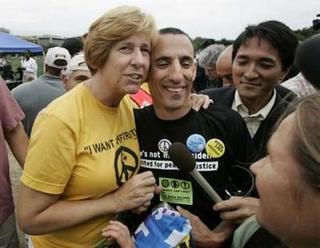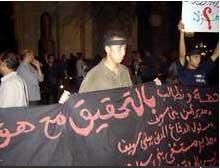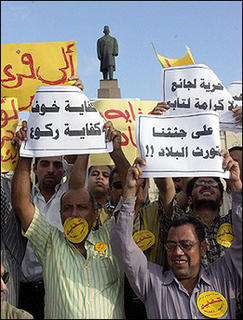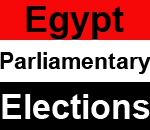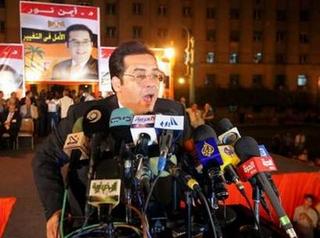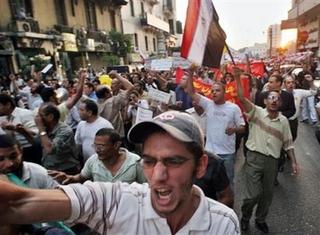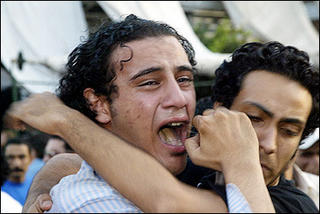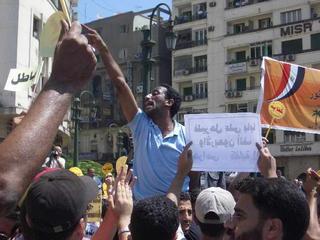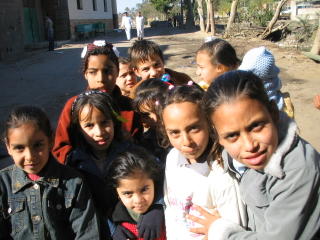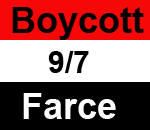
Banking sources in Beirut said Lebanon's central bank
lifted the bank secrecy of the accounts of two Syrian officials and six pro-Syrian Lebanese figures, including four charged with murder of Prime Minister Rafik Hariri, at the request of the UN commission. The list includes Syrian Interior Minister General Ghazi Kanaan, who previously served as Syria's military intelligence chief in Lebanon, and his successor, General Rustom Ghazaleh
Detlev Mehlis, head of the UN team investigating the killing of Hariri and 20 others, emphasized the significance of the arrests of four top Lebanese generals and a legislator days earlier and extended a message for others to come forward.
"The investigation is not over yet, but we feel we took a very important step," Mehlis said. "But these five suspects we have arrested, in our assessment, are only part of the picture."
On February 14, Lebanon lost a great man called Rafik Hariri. When the Lebanese civil war broke out in 1975, El Hariri was barely thirty years old - a young Lebanese immigrant running his own small construction company in Saudi Arabia. He was a self-made millionaire – a son of the poor south - who had dropped out of college after running out of funds. He started life as school teacher and ended up as one of the wealthiest men in the world. Through out the war years, Rafiq El Hariri spent a considerable portion of his personal wealth assisting his less fortunate countrymen. He began by building schools and hospitals in his native Sidon and setting up foundations to educate young Lebanese. At his personal expense, over thirty thousand students were given full scholarships for undergraduate and graduate studies in universities all around the world. One thousand of Hariri’s kids went on to earn doctorates.El Hariri’s real gift to the Lebanese was that he restored their self-confidence and sold them a futuristic secular democratic vision where Sunnis, Maronites, Greek Orthodox, Shia, Druze and Armenians could abide and prosper together in a united Lebanon.

Besides his developmental and economic efforts to lift up the economy of Lebanon, Hariri in the course was wining Lebanon’s independence from Syria that took the chance of the civil war to remain in Lebanon until before Hariri’s assassination. His developmental efforts were slowly liberating Lebanon and his death fully accomplished the mission to open to the road for the Cider Revolution with thousands of Lebanese people determined to build a democratic free Lebanon with no Syrian hegemony.
It is worth mentioning here that the Syrians make between 10 and 20 billion dollars a year from Lebanon. They are partners in everything. If the government wants to open a project to open roads, you have to have a Syrian partner. Syrians were getting royalties and income, not mention that many Syrians had never believed that Lebanon is a sovereign country.
Hariri’s assassination reminds me of another victim. I am sure many remember October 6, 1981, when President Anwar al-Sadat was attending an annual military parade celebrating the "successful" campaigns during the 1973 war and he got shot. He was saluting the troops when an assassination team ran from one of the parade vehicles and began firing weapons and throwing grenades into the reviewing stand. Sadat was killed and 20 others, including four American diplomats, were injured. "Also in the reviewing stand with Sadat were future UN Secretary-General Boutros Boutros-Ghali and Hosni Mubarek. Neither Mubarek nor Boutros-Ghali was injured." (The presence of Ghali is controvertial and questionable)
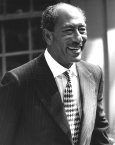
Convinced that peace with Israel would reap an enormous "peace dividend," Sadat initiated his most important diplomatic ploy. In a speech to the Egyptian parliament in 1977, Sadat affirmed his desire to go anywhere to negotiate a peace with the Israelis. Even, he affirmed, he would go to the Israeli parliament to speak for peace. The Israeli's responded with an invitation to do just that and Sadat's speech to the Israeli Knesset initiated a new momentum for peace that culminated in the 1978 Camp David Accords and a final peace treaty with Israel in 1979.
In the West, where Sadat was extolled as a hero and a champion of peace, the Arab rejection of the Camp David Accords is often confused with the rejection of peace. The basis for Arab rejection was opposition to Egypt's separate peace with Israel. Although Sadat insisted that the treaty provided for a comprehensive settlement of the Arab-Israeli conflict, the Arab states and the PLO saw it as a separate peace, which Sadat had vowed he would not sign. The Arabs believed that only a unified Arab stance and the threat of force would persuade Israel to negotiate a settlement of the Palestinian issue that would satisfy Palestinian demands for a homeland. Without Egypt's military power, the threat of force evaporated because no single Arab state was strong enough militarily to confront Israel alone. Thus, the Arabs felt betrayed and dismayed that the Palestinian issue, the core of the Arab-Israeli conflict, would remain an unresolved, destabilizing force in the region.
Both Hariri and Sadat are liberators. Hariri won Lebanon’s sovereignty and freedom and Sadat won peace. Enemies of Hariri and Sadat are the same if not the killers.
Drawing similarities between the Egyptian and Syrian regimes
- Egypt followed Syria’s pursuit in applying emergency law in 1981 following the assassination of President Sadat. Syria is run by state of emergency since 1963.
- Mubarak repeatedly said the emergency law is there for state security reasons. The Syrian emigrants' minister said “the state of emergency should only apply to "crimes that threatened the state security."
- Syria's media serve as state organs. Egypt has no private-run media in the true sense of the western world.
- Syrian prisons, known for their abysmal conditions in violation of minimum international standards, remained off-limits to independent domestic or foreign scrutiny. Egyptian prisons are not accessible. Detentions cases with no police investigations have been frequent especially with the Taba and Sharm El-Sheikh attacks.
- President Mubarak made it clear several times that economic reform is a priority but not political reform. President Assad has made clear his priority is economic rather than political reform.
- Upon his installation as a President in 1981, Mubarak returned back the Arab League seat to Cairo, adopting the pan-Arabism project that is embraced by the Syrian regime. Mubarak’s move renounced President Sadat’s project for peace. And Palestinian Chairman Arafat became the closest ally for Mubarak.
- On June 10, 2000, the Syrian parliament nominated Bashar Al-Assad, who is 34 years old, a few hours after the parliament voted to amend the country's constitution and lower the age of eligibility for the president's office from 40 to 34. Mubarak tailors the constitution to make believe that he is running in a multiple candidates elections while many opposition parties refused to participate because all their requests were overruled.
- Syria is adopting the father-son succession model and Egypt is pushing hard for one. Many claim that President Bashar Al-Assad is only the façade for the Baath old guard that are ruling the country. Egypt is facing similar conflict however between Mubarak’son who wants to replace his father's old guard with his business-like young guard. Recently, the contention was seen over press editors-in-chief replacements.
Pursing the "Syrian Dream"
Egypt considers the fascist pan-Arabism regime of Syria a model and godfather, one reason that makes the so-called Egyptian model for democracy with no credibility or integrity. The current shaking of the Syrian regime by the UN commission and the responsiveness of Syria to the Hariri's investigation put the followers of Syria’s ideology in trouble.
Pan-Arabism has always thrived with fundamental Islamism as they are in fact two wings for one bird. If Iraq today is trying to purse a true democracy renouncing pan-Arabism that the Iraqi dictator adopted for 35 years with a majority of Sunni ruling, the other wing will try to fly, one reason why fundamental Islamism is hitting Iraq in such brutal way. Iraqis’ attempt to disengage themselves from the pan-Arabism project of Syria is making the other wing merciless and atrocious. Egyptians paid President Sadat as a price for the return of the Arab League seat in Cairo and the Lebanese paid the life of PM Hariri.
Those who kill Iraqis are the same killers of President Sadat and Lebanese Prime Minister Rafik Hariri because they are not or did not pursue the “Syrian Dream”.
 I would say that audacious people like Detlev Mehlis and Spanish Judge Baltasar Garzon, who ordered the arrest of Chilean dictator Augusto Pinochet, are serious people with a determination to make courageous changes in the lives of some unprivileged peoples in the world. Hats off for them.
I would say that audacious people like Detlev Mehlis and Spanish Judge Baltasar Garzon, who ordered the arrest of Chilean dictator Augusto Pinochet, are serious people with a determination to make courageous changes in the lives of some unprivileged peoples in the world. Hats off for them.
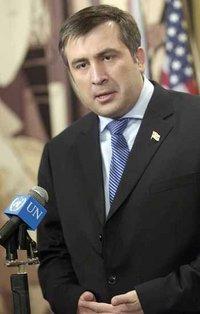 Egypt wants to replace the 24 years old emergency rule with anti-terrorism law that Egyptian Prime Minister Ahmed Nazif wants to pass in the People’s Assembly as reported by Steven R. Weisman in the New York Times.
Egypt wants to replace the 24 years old emergency rule with anti-terrorism law that Egyptian Prime Minister Ahmed Nazif wants to pass in the People’s Assembly as reported by Steven R. Weisman in the New York Times.
